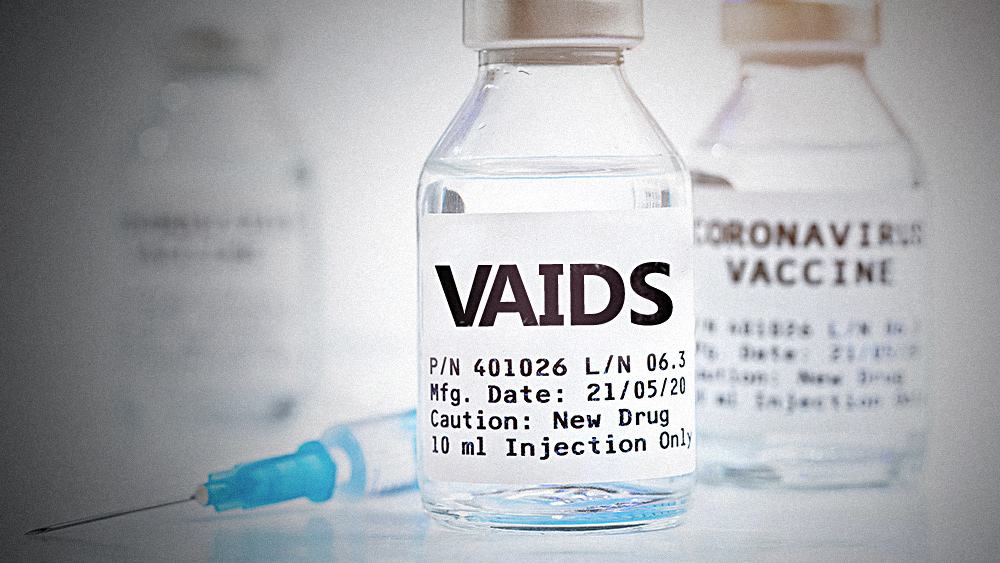Pfizergate: Ursula von der Leyen’s shady COVID vaccine deals prove she can get away with anything
05/02/2024 / By News Editors

Forget this whole “election” charade and just glue the crown onto her head, already.
(Article republished from RT.com)
Ursula von der Leyen, the unelected European Commission President, is up for job renewal in June. She’d have to be re-nominated by the majority of EU member state leaders and then re-confirmed by members of the newly-elected European Parliament. They’d have to be crazy to dethrone this ultimate incarnation of true EU values, like transparency and foresight (or rather, lack thereof).
One particular tale about Queen Ursula comes to mind that perfectly illustrates the point.
During Covid, the European Union rolled out a bloc-wide QR code system as proof of vaccination for travel, leisure, and in some cases a condition of employment – even as reports started raising doubts about how reliable the shot really was when it came to stopping infection, transmission, and death. It’s like there was this interest in Brussels to move fast in getting shots into arms as quickly as possible, and setting up this digital identity system linked to jab status before the scary music stopped or people just tuned it out. Skeptical members of the European Parliament have been demanding to know what kind of deal the bloc’s leadership actually signed with the manufacturers of these injections. We’re talking about 11 contracts, 4.6 billion vaccines, and €71 billion of public money transferred to Big Pharma.
So far, neither the citizens who paid for all of it, nor their elected representatives have been able to get full transparency on those deals. According to research published last year by the French NGO Global Health Advocates, and the UK based health nonprofit, StopAids, the European Commission “agreed to extensive confidentiality requirements with pharmaceutical corporations that may not be fully consistent with EU legislation,” and that of the contracts analyzed with AstraZeneca, Pfizer, and Moderna, “the Pfizer contract was the most significantly redacted.” Specifically, they noted that the European Commission “redacted the most information about product safety and indemnification in the Pfizer and Moderna contract,” concluding that “it looks like most of the risk was borne by the EU in a desperate attempt to get access to these vaccines.”
The reports also draw attention to the lack of interest on the part of certain Big Pharma CEOs when it comes to accountability towards their customers – their end-clients who received and ultimately paid for the jabs: average EU citizens. “We provided Pfizer, AstraZeneca, and Moderna the opportunity to react to the claims… but we did not receive a response,” the NGOs said.
It turns out that Pfizer CEO Albert Bourla is also the same person who was exchanging private text messages with von der Leyen the month before the Pfizer contract was negotiated. How do we know that? Because she said so herself in April of 2021 in a New York Times interview. While she was busy doing that, questions arose over how German defense contracts were being awarded. Politico reported on it in 2019, citing the increased use of consultants during her time in office, and she ultimately copped to “mistakes” having been made. Nor would they be the last of their kind, apparently.
By 2020, von der Leyen told the New York Times, she was going back and forth with the Pfizer chief via text message for a month at the height of the pandemic, with the result being a “1.9 billion dose order from Pfizer” (to be precise, a 900 million order with another 900 million option that hasn’t been exercised) through 2023, according to the newspaper, with 4.6 billion doses in total ordered from all drug manufacturers. Why so many doses for a EU population of just 448 million? “I am convinced that we are in this for the long haul,” she told the newspaper in April 2021.
Good thing that contracts worth €71 billion euros (in the case of Covid) aren’t based largely on the whims and feelings of freewheeling unelected bureaucrats and involve transparency and open debate and discussion about any terms in an effort to avoid any potential future pitfalls, right? Whoops, too late. By December 2023, von der Leyen’s “long haul” had derailed, dumping doses all over the continent, with about €4 billion in Covid vaccines ending up in landfills across Europe, according to Politico.
More recently, individual EU member states have been left to do the litigation tango with Pfizer themselves, as the company sued them over failing to pay for doses that they didn’t need or want anymore now that they can’t force the jab on anyone or scare people into taking it. The original Pfizer-EU contract was amended last year to reduce the original number of doses purchased, but Brussels told member states that they were still on the hook for having to pay a cancellation fee for each dose they no longer want. And instead of pumping the jabs into arms by 2023 to liquidate the stock, the EU would have three more years to try drumming up continued interest among its citizens.
Not that anyone has any idea what the original contract even was. Perhaps von der Leyen’s text messages could provide a clue. But they’ve magically vanished, and she doesn’t seem too interested in making an effort to recover them forensically. The New York Times is suing to get a hold of them, and the European Public Prosecutor’s Office has recently taken over from Belgian authorities in investigating criminal allegations of “interference in public functions, destruction of SMS, corruption and conflict of interest.”
European parliamentarians on the bloc’s Covid-19 committee expressed their interest in having von der Leyen answer to their committee on these contract negotiations in person, but she doesn’t share that interest. Nor does Bourla – which led the committee to request that his access privileges to the EU parliament be revoked. Not that he needs them anyway when he has Queen Ursula’s direct line.
It’s important for European democracy to be “safe and secure,” von der Leyen said in February in announcing a desire to remain on her throne after June’s EU parliamentary elections, in which she refused to run in her home country despite being encouraged to do so for petty reasons of democratic legitimacy. “Safe and secure” from what, exactly? Russia, of course. It’s actually kind of surprising that she hasn’t yet accused Moscow of deleting her texts with Bourla, too.
Von der Leyen has proven to be an unstoppable tank when it comes to crushing pesky formalities, rolling right over Pfizergate like a minor speedbump.
Just last month, she was confronted in writing by EU chief diplomat Josep Borrell, Internal Markets Commissioner Thierry Breton, and some of their colleagues over her commission’s selection of the EU’s small and medium-sized business envoy, who just happens to be a fellow German from her own CDU party back home, while also scoring the lowest among the candidates up for the job. EU lawmakers have also lamented the lack of transparency in selecting someone for a position worth €17,000 a month.
Ursula von der Leyen talks a good game about transparency, despite demonstrating a tenuous personal grasp of the concept. Kind of like the entire EU does on a regular basis. Virtue-signaling democratic values while making a mockery of them is what makes this Queen the perfect reflection of her Kingdom.
Read more at: RT.com
Submit a correction >>
Tagged Under:
Albert Bourla, big government, Big Pharma, conspiracy, corruption, covid-19, European Commission, evil, globalists, insanity, Medical Tyranny, pandemic, Pfizer, pharmaceutical fraud, politics, rigged, traitors, Twisted, unelected bureaucrats, Ursula von der Leyen, vaccine wars, vaccines, Xpost
This article may contain statements that reflect the opinion of the author
RECENT NEWS & ARTICLES
COPYRIGHT © 2017 PLAGUE INFO



















